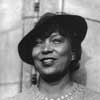
Zora Neale Hurston (Library of Congress) Anthropologist, Author, Civil Rights Activist
MARCH: WOMEN’S HISTORY MONTH
Women and Adversity: Zora Neale Hurston
Anthropologist, Author, Civil Rights Activist
Crossword puzzle enthusiasts will recognize the name Zora Neale Hurston, although they may not know what her accomplishments are or why she’s to be remembered. She is another example of a woman who used her multiple talents to the highest degree she could.
Zora was born in 1891 in Notasulga, AL, the daughter of two former slaves, although she claimed to be born in 1901 in Eatonville, FL. Eatonville was the first incorporated all-black town in the U.S. The reason she fudged on her birth date:
- Blacks under 20 could get a free public school education in Maryland
Zora’s education had been interrupted when she was 13 and her mother died. Various reasons interfered with further study, but by 1917 she wanted to go to school, so she made herself ten years younger. It paid off because she went on to:
- Attend the historically black Howard University in Washington, D.C.
- Receive a scholarship to Barnard College where she studied anthropology and graduated in 1928
- Continue that interest for two more years at Columbia University
- Be recognized as a member of the Harlem Renaissance in New York, the cultural center for blacks during the early 1900s
- Concentrate on writing about the black experience
- Believe in hoodoo, the American version of voodoo
- Write novels, short stories, essays, plays and folktales
Zora received acclaim for the 1926 short story “Sweat,” her 1928 autobiographical essay “How it Feels to Be Colored Me,” and the 1935 collection of black folktales Mules and Men She married Herbert Sheen, fellow Howard student, in 1927 but they divorced in 1931. Then in 1937 her novel
Their Eyes Were Watching God was published. It’s the story of Janie Crawford who searches for her destiny and recounts her convoluted path to reach it. It is considered a masterpiece.
Zora married Albert Price III, a fellow Floridian, in 1939 but they divorced in 1943. Throughout her lifetime she held numerous jobs: journalist, story consultant to Paramount Pictures, entertainer, drama teacher at North Carolina College for Negros and finally, desperate for money, she was a maid.
In 1959 she suffered a stroke and moved into St. Lucie County Welfare Home in Florida. She died in 1960, poverty stricken.
Famed novelist Alice Walker was instrumental in reviving interest in Zora’s works.
More information about Zora Neale Hurston:
www.zoranealehurston.com/about/index.html
www.shmoop.com/zora-hurston/timeline.html
www.biography.com/news/zora-neale-hurston-biography-facts-black-history